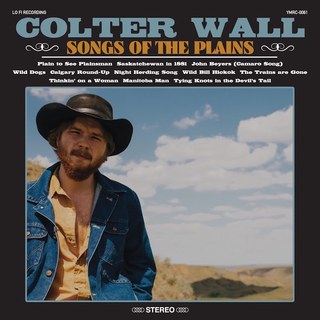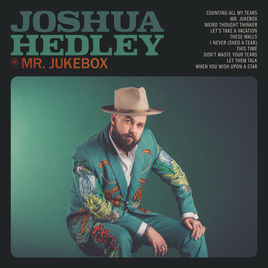Rating: 6/10
Colter Wall could be a timeless voice of this generation, and I believe he will be. When I first heard his voice, coming straight out of the past and echoing the ghost of Johnny Cash, I got chills. And his stories match his voice; he weaves tales of hopping trains and plowing fields with a natural ease, and not dated by his language but rather enhanced by it, for his turns of phrase would seem more forced if he modernized them, a direct contrast to so many of his peers who seem to choose their words carefully and intentionally to evoke days gone by. But unlike so many of these–Joshua Hedley and Zephaniah O’Hora come to mind immediately–Colter’s not trying to revive classic country. He’s not trying to bring back the outlaw era, an exercise so worn out by now that the effort to be an outlaw has become a cliché. Rather, Colter Wall goes even beyond that, seeking to keep alive the oldest forms of country and folk music, going back to the days of Wooddy Guthrie and Roger Miller for his inspiration and preserving those primitive styles and traditions in his songwriting.
Songs of the Plains seems like a natural progression for Wall, an album made in tribute to his prairie homeland in Canada and featuring some traditional tunes from his home country as well as Colter’s originals. The idea is fresh as well, keeping Colter firmly within the parameters of what he does best while also dispelling the notion created for some by his last album that he could only sing about these things for so long and in so many ways before it became stale and uninteresting. Perhaps it is the power and magic of his voice, or perhaps it’s because people have been so starved for this sound and in some cases have never been exposed to it at all, but there’s no doubt that Colter Wall’s music is resonating with many and opening windows to the past. There was the concern that he’d be a niche performer, but that niche has made him unique and seems to be what many have been longing to hear, even if they didn’t quite know it themselves. Songs of the Plains doubles down on all of it, more sparse and primitive in numerous places than Wall’s previous efforts, and it should have been a fantastic listen.
Indeed, it could have been a fantastic listen. Certainly the opener, “Plain to See Plainsman,” stands out as a brilliant ode to the prairie and starts off the record in fine fashion. Colter Wall’s love for his homeland is on full display here, and it’s one of the highlights of the whole album. “Thinkin’ on a Woman” is an excellent moment as well, a classic country heartbreak song that should have been written fifty years ago when it would have been a mainstream hit. As for the covers, “Calgary Round-Up” was a great choice, and “Night Herding Song” fits in well after it, almost like an outro. It’s hard even to distinguish these as covers given how naturally they work on this album. And then there’s “Manitoba Man,” an original which comes out of nowhere near the end of the record to remind us all that Colter Wall’s voice is not just special for its timbre but also for its ability to capture raw emotion. I think this one may be overlooked among the other songs, and that would be a shame, for it’s definitely a standout here and in Wall’s young discography.
But too often, this album is just a scattershot, frustrating listen. “Wild Dogs” is the worst misstep, and although not Colter’s original work, it was a terrible choice for a cover and just makes for a very weird, unnecessary moment. The song itself is just awful and strange, but it’s not fair to dwell on the writing as much as the choice by Wall to cover it here. AS for Colter’s own writing, the lyrics are mostly strong, although some songs feel underdeveloped. “The Trains are Gone” is just boring and forgettable, and “John Beyers (Camaro Song”) just feels too short, as if Colter stopped writing in the middle of the story. Also, you can find the same melodic line in “saskatchewan in 1881” that was present in “Bald Butte” on his debut record. I enjoy both these songs, and this might be more easily excused if the same melodic line didn’t come up again in “The Trains are Gone.” It just seems like such a lazy songwriting decision and one which Colter Wall is better than making.
There are some lazy production decisions as well. On the surface, the production seems perhaps more interesting than that of his first full album, with harmonica and steel adding color to some of these tracks. Many criticized the production of Wall’s self-titled record as being too plain, too sparse, and even boring. Personally, I felt Dave Cobb did well by getting out of the way and letting the songs speak for themselves, and I enjoy the fact that Colter often needs nothing more than his voice and a guitar to bring those songs to life. But when you’re relying so heavily on a voice and guitar, the guitar work needs to be better. There is noticeable, constant buzzing of the strings in several of these songs, most obviously in “John Beyers (Camaro Song.”) This song, as mentioned, also seems too short, and the whole thing just comes across as unfinished and rushed. The buzzing guitar strings return in “Wild dogs” and in “Thinkin’ on a Woman” and really, in places all over this record. This is something you hear inevitably with acoustic guitars, and hearing it on occasion can even add to the live feel of a song, as the imperfection brings the human touch to the recording. But it is so constant in some of these songs that it becomes distracting, and the obvious question is why did Colter wall accept these recordings as the final versions he wanted to send out to the public? Once again, he is just better than this.
This record is ultimately just not up to the standards Colter Wall has set for himself. The idea behind it was fantastic, and there are some excellent songs on this album. “Plain to See Plainsman,” “Manitoba Man,” and “Thinkin’ on a Woman” particularly stand out as being timeless additions to Wall’s discography. But the album as a whole just feels rushed and underdeveloped. It’s a collection of little things, but all those small decisions add up to a finished product that seems unfinished. Clean this record up a bit, and it improves significantly. Just a little more care was needed to make this album what it could have been. The potential and talent in Colter Wall remain endless, but unfortunately this album as a whole falls short of that potential.
The Great
The Weird

